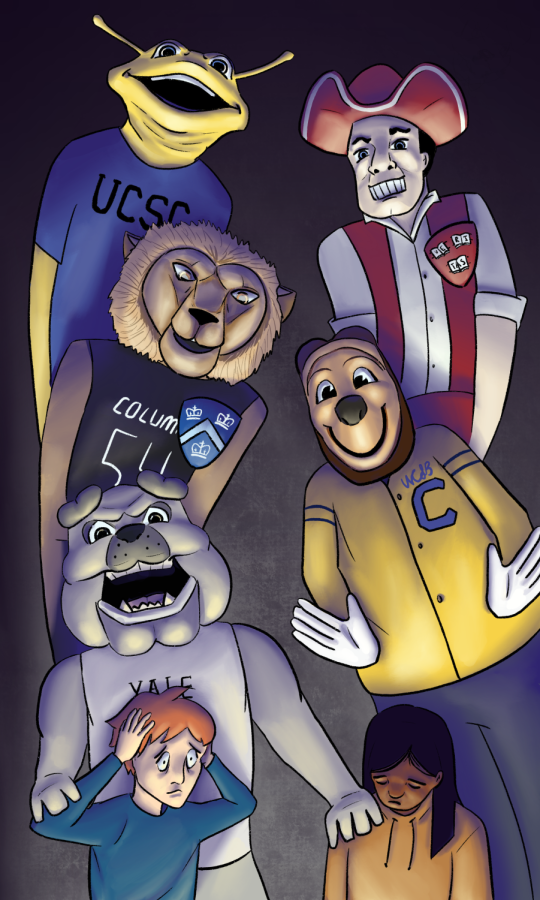We are more than where we will go from here
SENIOR NIGHTMARES: Five nights into admissions, college mas- cots loom over students stressing about the quality of their applications.
May 27, 2022
Year after year, students clamor around The Oak in search of the long-awaited centerspread: a map of the United States, along with the names of seniors listed under which college or institution they will be attending that fall. Chatter and shouts, laughter and whispers bound across the halls as fingers trace each corner of the print. The news circulates through direct messages and parent group chats, unfolding onto dinner tables.
There’s no question that the age-old tradition of the college map in the senior issue centerspread was made with the best of intentions—a cause for celebration of the blood, sweat and tears each graduating senior poured into their years of public education and tedious college applications—but it utterly fails to recognize the efforts of those that won’t be taking the often defaulted to Northwood-to-college pipeline.
Too often the “toxic academic environment” at Northwood is acknowledged but never addressed. Although no singular group of individuals is the root cause for Northwood’s elitist attitude toward college, it’s clear that The Howler championing college admissions every year promotes the unrealistic perception that a student can only be considered successful if they will be attending a so-called prestigious institution. Thus, The Howler has decided to no longer publish an annual college decision map.
Over the years, our best efforts to make the map represent all seniors at Northwood have failed. The data we use to make the map is self-reported via the senior survey, and we often found it to be inaccurate, as students were frequently listed under a college they didn’t actually attend. Furthermore, it is difficult to identify those who do not select college as their next destination.
Without inclusive and reliable data, we were left feeding into the elitist notion that attending a college immediately following high school graduation is the only acceptable path forward, which ostracizes the approximately 5% of Northwood seniors each year that elect to take alternative paths such as trade school, joining the military or taking a gap year. While this is a small proportion of the senior class, replacing the college map with a more inclusive spread would make a big difference to those 1 in 20 seniors who otherwise would not be celebrated along with the rest of the senior class.
Even for those planning to attend college next, this spread often induces more anxiety than contentment. Especially in Northwood’s competitive academic culture, the map invites unwanted, toxic comparisons between peers that do not factor in personal aspirations and circumstances. Instead it becomes a measure of worth, effort in school and entitlement. Somehow those that got into elite schools are seen as superior in the eyes of outsiders, having “won” high school.
The accuracy issue inherent in self-reported data is only amplified by students who opt out of the map for fear of facing judgment over their choice. In 2020, 27.3% of seniors opted out of inclusion in our map, and that number skyrocketed to 48.8% in 2021. This creates a false impression that skews attendance towards top-ranked universities, placing an invisible yet heavy burden on underclassmen who are indoctrinated to believe that the name of their future college is the chief determinant of their worth as a person.
To clarify, we are not denying that making it into an elite school is an accomplishment worthy of celebration. But when trying to celebrate that accomplishment results in students (and parents) defining worth through comparison to the successes of others, a toxic environment is fostered. Through the college map, questions of how deserving or hard-working a student is are immortalized in a place where not only classmates, but also distant acquaintances and strangers can make presumptions based solely upon the college a student plans to attend.
Needless to say, college is not a reflection of one’s character, nor is it an accurate depiction of one’s individual effort, as admissions often do not holistically account for students’ various circumstances. What ultimately matters is your skill set, which can be developed at any college, and your willingness to advocate for yourself. Thus, we must reconsider how to display our shared sense of pride for persevering through high school in a way that does not reduce our experience to a name on a map.
Students that wish to share their future plans can do so through social media or gatherings of friends and family. Furthermore, seniors should relish in the knowledge that those who deeply care for them will not need a centerspread to celebrate their future plans; and for those who wish to know where every college-bound senior will be heading, consider that, if you haven’t been told personally, it’s really none of your business.

























































